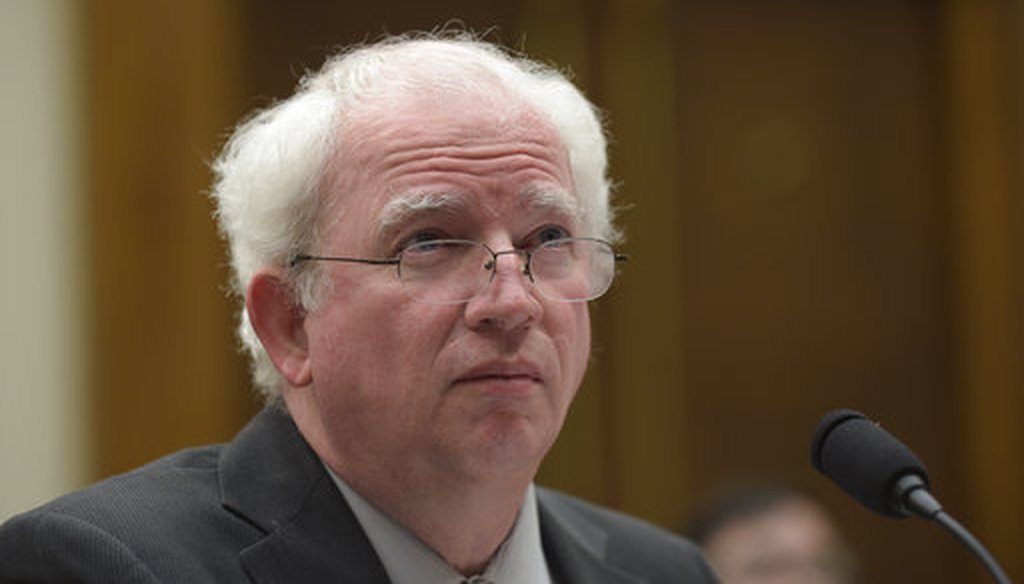Stand up for the facts!
Our only agenda is to publish the truth so you can be an informed participant in democracy.
We need your help.
I would like to contribute

Chapman School of Law professor John Eastman testifies on Capitol Hill on Thursday, March 16, 2017 (AP/Walsh)
An old word — "emoluments" — is finding new life in the news, as a federal appeals court on July 10 dismissed one of three major lawsuits on the issue against President Donald Trump.
The lawsuits have alleged that Trump has violated an anti-corruption provision in the Constitution by accepting emoluments from foreign government officials.
The appeals court’s decision came just two days after the Justice Department asked another appeals court to halt a similar lawsuit by congressional Democrats.
But even before that news hit the headlines, TV pundits were debating whether Trump’s hotels could be putting him in violation of the Constitution’s foreign emoluments clause. On the July 7 episode of Fox News’ "Life, Liberty and Levin," conservative host Mark Levin broached the subject, calling emoluments "one of the most boring issues in America."
Levin noted how some people say Trump is illegally accepting emoluments by letting foreign diplomats pay to stay and eat at his luxury hotel in Washington. Levin asked his guest, lawyer John Eastman, if these revenues should be considered "an unconstitutional benefit."
"If that were the case, then President Obama accepting the Nobel Peace Prize would have been an unconstitutional emolument," said Eastman, professor of law at Chapman University. "Any president that owned stock in any foreign corporation that had ties to a foreign government, when that stock price goes up because of some action of the foreign government, that would be an unconstitutional emolument."
Really? We thought Eastman’s comparison seemed like a stretch, so we decided to look into what exactly qualifies as an illegal foreign emolument.
Specifically, would Obama’s one-time Nobel Peace Prize actually count the same as Trump’s vast web of hotels, golf clubs and other businesses?
We decided against rating Eastman’s claim on the Truth-O-Meter, since the courts haven’t made a final ruling on the lawsuit brought by Democratic lawmakers.
Still, we found his comparison misses some key points.
What is the foreign emoluments clause?
Essentially, the foreign emoluments clause prohibits high-level U.S. officials from accepting gifts or benefits from foreign governments.
The Constitution’s framers designed the clause to safeguard against corruption and foreign influence and prevent federal officials from cutting deals with foreign governments that are not in the United States’ best interest.
The clause has rarely been tested in court, but the Justice Department’s Office of Legal Counsel has examined it about 50 times over 150 years in order to advise government officials about what’s prohibited, said Kathleen Clark, professor of law at Washington University in St. Louis.
Trump’s hotels
Trump has backed off day-to-day control of his businesses, but he’s still an owner, and critics have accused him of letting foreign officials stay at his hotel in an effort to curry his favor.
In addition to congressional Democrats, a number of private parties and the attorneys general from Washington, D.C., and Maryland filed lawsuits against Trump — so far without success.
The three major lawsuits have alleged that Trump is violating the foreign emoluments clause through his continued business activity and his failure to seek congressional approval on business matters involving foreign governments.
But at this point, only the congressional Democrats’ lawsuit has avoided being dismissed, and no decision has been made on the Justice Department’s request to stop it. Until that case wraps up, it remains unclear whether Trump has violated the foreign emoluments clause.
Eastman said Trump is safe, because his business is "a corporation, a separate legal entity."
"Normal business transactions have never been viewed as emoluments," he said. "If they are, then a large number of presidents have been in violation."
But no president has ever had wealth or holdings like Trump. Since Trump took office, several foreign countries have hosted national holiday celebrations at his Washington hotel, including Kuwait, Saudi Arabia, Turkey and the Philippines, per NBC Washington. An entire section of the Democrats’ lawsuit is devoted to Trump’s "acceptance of payments for hotel rooms and events."
"Foreign governments are deciding to hold events at the Trump hotel, providing a benefit to President Trump through his company," Clark said. "That’s exactly the sort of thing that the Justice Department prohibited in the past."
Obama’s Peace Prize
That’s hardly comparable to the benefits Obama received when he won the Nobel Peace Prize in 2009.
"The foreign emoluments clause applies when you get something from a foreign government, and what the Department of Justice opined when Obama won the Peace Prize was that the money wasn’t coming from a foreign government," said Andy Grewal, professor of law at the University of Iowa.
Eastman told us that although Obama donated the prize’s cash award to charity, he received "a direct honor and remuneration from an entity that is quasi-governmental."
But as we noted in 2009, the Nobel Peace Prize Committee is an independent body, even though its members are appointed by the Norwegian parliament. The reason the parliament is involved is because prize founder Alfred Nobel said he wanted it to select the committee.
That level of separation matters, Clark said, because a central issue in emoluments cases is whether the foreign government is actually deciding to provide the benefits to a U.S. official.
"Sometimes the benefit is coming from an organization that has some connection to a foreign government, but the decision to give the benefit isn’t actually coming from a foreign government," she said. "It has to do with who’s making the decision."
Other examples
At the same time, Grewal agreed with Eastman that a court decision against Trump could mean other U.S. presidents have also violated the foreign emoluments clause — including Obama.
Specifically, he pointed to a footnote in the opinion on the recently dismissed case, where the judge refused to speculate on the Justice Department’s claim that royalties Obama got from overseas book sales could qualify as emoluments for the same reasons as Trump’s hotel revenues. (Grewal made this very argument himself in the Yale Journal of Regulation's blog.)
But Clark said any application of the foreign emoluments clause to Obama’s book sales would depend again on which entity decided to deliver the benefit — or, in this case, order the books.
In the case of Obama selling books to public universities overseas, Clark said the clear line between the universities and the foreign government should eliminate emolument concerns.
The same reasoning would apply to Eastman’s foreign stocks example, Clark added. Only if the corporation is controlled by a foreign government would a president with stocks be in violation of the foreign emoluments clause.
"Simply having a tie to the foreign government isn’t sufficient to trigger the prohibition of the foreign emoluments clause," she said. "The analogy is completely misplaced and misleading."
Our Sources
Fox News, "Life, Liberty, & Levin — Sunday, July 7," July 7, 2019
Donald J. Trump on Twitter, July 8, 2019
The National Archives, The U.S. Constitution, accessed July 8, 2019
Congressional Research Service, "The Emoluments Clauses of the U.S. Constitution," June 17, 2019
U.S. District Court for the Southern District of New York, Memorandum Decision and Order by Judge George B. Daniels, Citizens for Responsibility and Ethics in Washington, et. al. v. Trump, filed Dec. 21, 2017 (accessed via Politico)
U.S. District Court for the District of Columbia, Blumenthal, et. al. v. Trump, filed Aug. 15, 2017 (accessed via the Constitutional Accountability Center)
U.S. District Court for the State of Maryland, D.C. and Maryland v. Trump, filed June 12, 2017 (accessed via the Washington Post)
U.S. District Court for the District of Columbia, Memorandum Opinion of Judge Emmet G. Sullivan, Blumenthal, et. al. v. Trump, April 30, 2019 (accessed via the Washington Post)
U.S. District Court for the District of Maryland, Opinion of Judge Peter J. Messitte, Blumenthal, et. al. v. Trump, April 30, 2019
U.S. Court of Appeals for the Fourth Circuit, Opinion of Judge Paul V. Niemeyer, D.C. and Maryland v. Trump, filed July 10, 2019 (accessed via the Washington Post)
Yale Journal of Regulation, "Should Congress Impeach Obama for His Emoluments Clause Violations?" Dec. 13, 2016
The Brookings Institution, "The Emoluments Clause: Its text, meaning, and application to Donald J. Trump," Dec. 16, 2016
The Guardian, "Trump defends foreign income: Obama sold books to universities abroad," June 10, 2017
NBC Washington, "Philippines Latest Foreign Country to Book the Trump International Hotel," April 28, 2018
The Washington Post, "Democrats’ emoluments lawsuit against President Trump can proceed, federal judge rules," June 25, 2019
The New York Times, "Judge Rejects Government’s Request to Halt Emoluments Suit Against Trump," June 25, 2019
The New York Times, "Justice Dept. Seeks to Halt Democrats’ Suit Over Trump’s Profits in Office," July 8, 2019
The Washington Post, "Appeals court dismisses ‘emoluments’ lawsuit involving President Trump’s D.C. hotel," July 10, 2019
PolitiFact, "Does Obama need Congress' permission to get Nobel?" Oct. 26, 2009
PolitiFact, "Trump lawyer: Foreign dignitaries staying in a Trump hotel doesn't violate Constitution," Jan. 13, 2017
PolitiFact, "Donald Trump's claim of 'no financial interests' in Saudi Arabia? That's Half True at best," Oct. 18, 2018
Phone interview with Andy Grewal, professor of law at the University of Iowa, July 8, 2019
Phone interview with Kathleen Clark, professor of law at Washington University in St. Louis, July 9, 2019
Email interview with John Eastman, professor of law at Chapman University, July 9, 2019






























